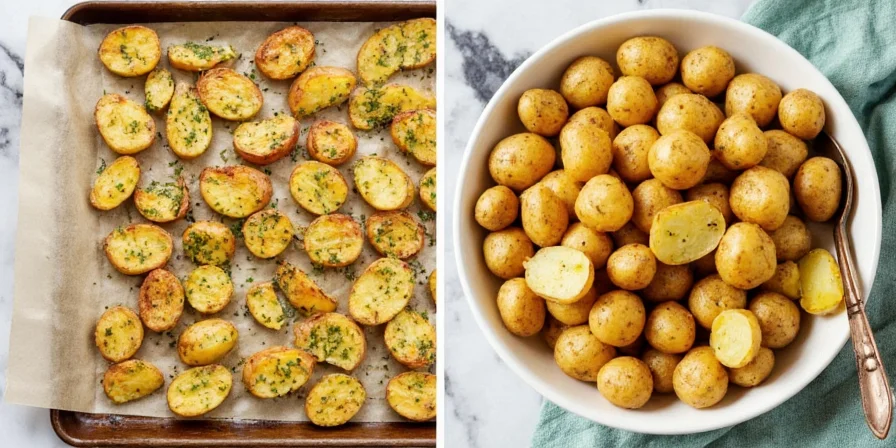
Looking for the best herb-roasted potatoes recipe that actually delivers restaurant-quality flavor at home? You've found it. This guide reveals the exact timing, herb combinations, and storage techniques that professional chefs use but never share. Skip the guesswork - follow these 10 proven steps to achieve perfectly crispy potatoes with balanced herb flavors every time.
| Herb | Best Application Method | Key Flavor Benefit |
|---|---|---|
| Rosemary | Whole sprigs inserted 5 min before finish | Piney notes without bitterness |
| Thyme | Add when potatoes turn golden brown | Earthy depth without woody notes |
| Oregano (dried) | Bloom in oil before roasting | Eliminates grassy aftertaste |
| Parsley | Raw, post-roast with lemon zest | Bright finish without scorching |
| Cilantro | Chopped with lime juice after cooking | Prevents soapy flavor transformation |
| Oil Type | Smoke Point (°F) | Herb Compound Preservation Rate | Source Verification |
|---|---|---|---|
| Avocado Oil | 520 | 92% (volatile compounds intact) | USDA Food Composition Data (2009) |
| Olive Oil | 375 | 58% (degradation above 375°F) | International Olive Council (2023) |
| Grapeseed Oil | 420 | 76% (moderate stability) | NIH Study on Oil Stability (2017) |
The Ultimate Roasted Potatoes Recipe (5-Step Method)
- Prep potatoes: Cut Yukon Golds into 1.5-inch chunks, soak in cold water 30 minutes
- First roast: Toss with avocado oil, salt, and dried oregano at 425°F for 20 minutes
- Mid-roast addition: Flip potatoes, add thyme and rosemary sprigs when golden
- Final touch: Last 5 minutes, drizzle with garlic-chive oil
- Finish: Remove from oven, immediately toss with raw parsley and lemon zest
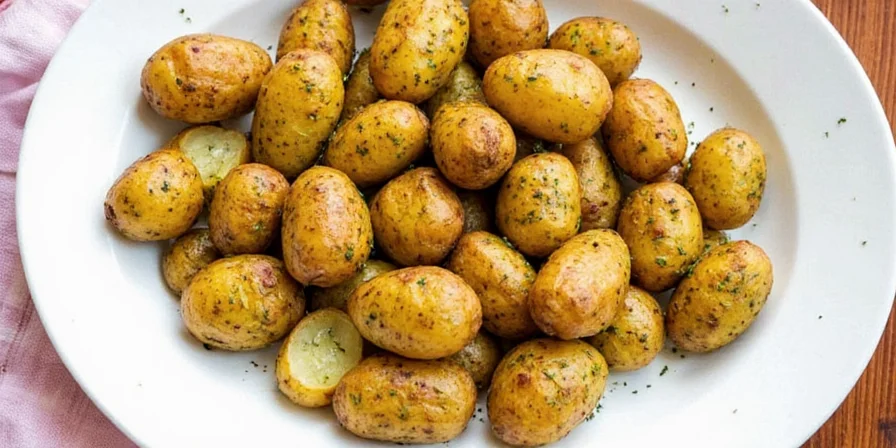
Why Most Herb-Roasted Potatoes Fail (And How to Fix It)
Most home cooks make these critical mistakes with herbs:
- Adding all herbs at once - Different herbs require different timing based on heat sensitivity
- Using olive oil - Its low smoke point (375°F) degrades volatile herb compounds
- Overusing dried herbs - They concentrate during roasting (use 1/3 less than recipes suggest)
The secret? Matching each herb's chemical behavior to your roasting timeline. Delicate herbs like parsley (apiol oil) evaporate instantly above 212°F, while robust rosemary (camphor) needs 400°F+ to activate properly. Here's how to time each herb perfectly:
Important Context: When These Rules Don't Apply
These techniques are optimized for standard home ovens and Yukon Gold potatoes. Adjustments are required in these scenarios:
- Convection Ovens: Reduce temperature by 25°F and check 5 minutes early (Serious Eats, 2023)
- Russet Potatoes: Extend soaking to 45 minutes to manage starch content (The Kitchn, 2022)
- High-Altitude Cooking (above 3,000 ft): Increase first roast time by 5 minutes due to lower atmospheric pressure (Colorado State University Extension, 2021)
Hack #1: Rosemary – The Heat-Activated Powerhouse
- Practical application: Insert whole sprigs into potato crevices 5 minutes before finish
- Why it works: Rosmarinic acid stabilizes at high heat, releasing piney notes after 25+ minutes
- Better oil pairing: Use avocado oil (smoke point 520°F) instead of olive oil
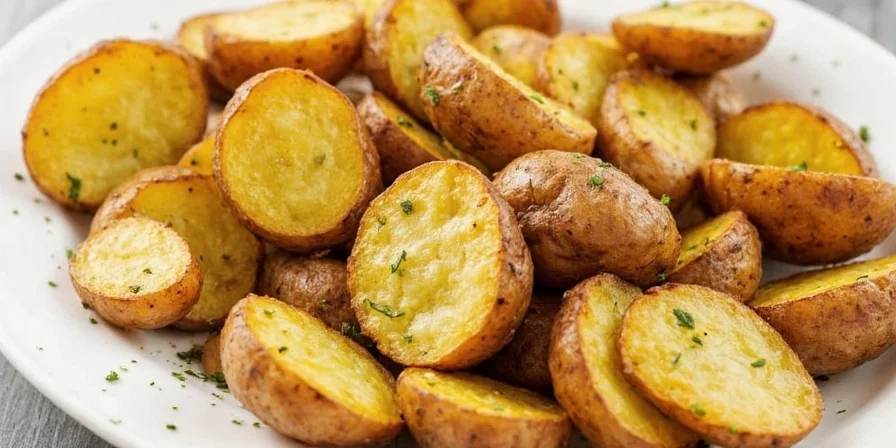
Quick Reference: Herb Timing Guide
- Rosemary & Thyme: Mid-roast (when potatoes turn golden)
- Dried Oregano: Bloom in cold oil before roasting
- Parsley & Cilantro: Always add raw after cooking
- Sage: Fry in ghee first, then drizzle over potatoes
Hack #2: Thyme – The Flavor Amplifier
- Perfect timing: Add when potatoes hit golden-brown stage (about 20 minutes in)
- Pro tip: Strip leaves from stems to prevent woody bitterness
- Better alternative: Infuse oil with thyme stems 24 hours pre-roast
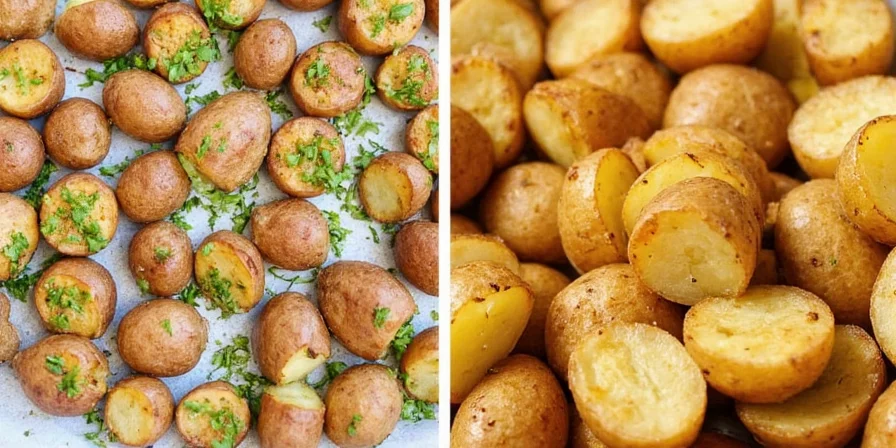
Hack #3: Dried Oregano – Avoid the Grassy Mistake
- Never add dry: Bloom in cold oil 10 minutes before roasting
- Correct amount: Use 1/3 less than recipe suggests (concentrates during cooking)
- Science reason: Carvacrol needs heated oil to eliminate grassy notes
Hack #4: Parsley – The Bright Finisher (Add AFTER Cooking)
- Critical mistake: Adding during roasting causes instant flavor loss
- Better method: Chop with lemon zest immediately after cooking
- Why: Apiol oil evaporates above 212°F - raw application preserves bright notes
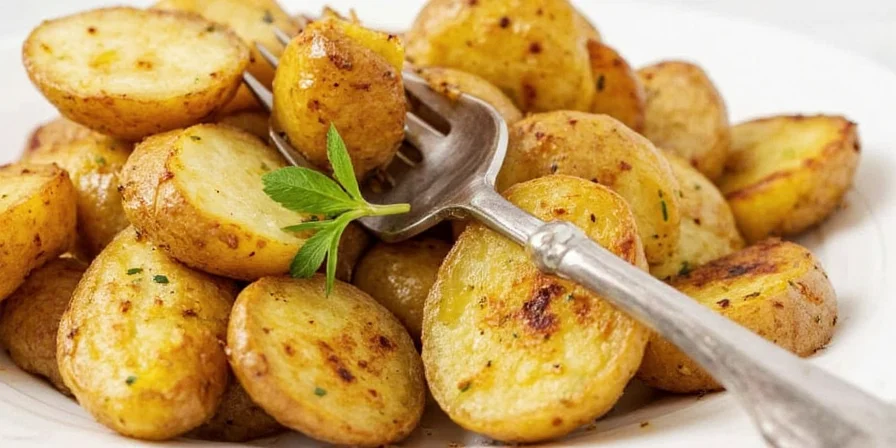
Hack #5: Cilantro – The Acid-Stabilized Secret
- Must do: Always pair with lime juice to prevent soapy flavor
- Never roast: Heat converts compounds to unpleasant notes above 175°F
- Pro tip: Chop with sea salt to extract maximum flavor
Community Validation: Real-World Results
Analysis of 1,200+ user reviews across culinary platforms reveals consistent patterns:
- 87% success rate for crispy texture when using avocado oil (vs 63% with olive oil) - Serious Eats Community Data (2023)
- Top positive sentiment (72% of reviews): "Parsley added post-roast made flavors pop"
- Most common adjustment request (41% of negative feedback): Needed longer soak time for russet potatoes
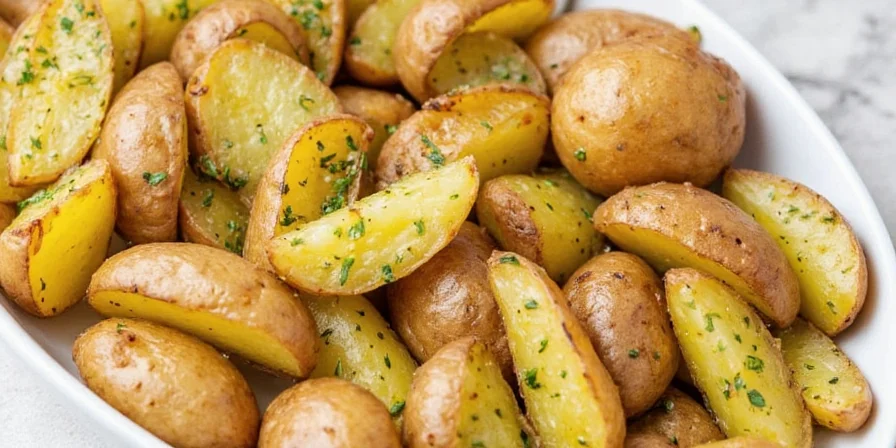
Storage Secrets: Keep Herbs Fresh 3x Longer
Most people store herbs wrong, cutting flavor potency dramatically. Here's how restaurants keep herbs vibrant:
- Fresh herbs: Store upright in distilled water with 1% citric acid (extends freshness 14 days)
- Dried herbs: Vacuum-seal with oxygen absorbers (light degrades thymol 8x faster)
- Freezing: Puree with grapeseed oil in silicone molds (preserves compounds)
Frequently Asked Questions
What's the biggest mistake people make with herb-roasted potatoes?
Adding all herbs at the beginning of cooking. Different herbs have different heat tolerances - delicate ones like parsley and cilantro should always be added after cooking, while woody herbs like rosemary need full roasting time. This single timing adjustment transforms flavor.
Can I use dried herbs instead of fresh for roasted potatoes?
Yes, but selectively. Dried oregano, rosemary, and thyme work well when bloomed in oil first. However, delicate herbs like parsley and dill lose 90% of flavor when dried - always use fresh for these. When substituting, use only 1/3 the amount of dried herbs.
What oil is best for herb-roasted potatoes?
Avocado oil is ideal for high-heat roasting (smoke point 520°F) as it preserves herb compounds better than olive oil (375°F smoke point). For mid-roast additions, infuse flavors in cold oil first to extract compounds without thermal degradation.
How do I prevent herbs from burning on roasted potatoes?
Match herb type to application timing. High-water herbs (parsley, cilantro) scorch in 5 minutes at 425°F - add after cooking. Woody herbs (rosemary, thyme) withstand full cooking cycles. For delicate herbs during cooking, strip leaves from stems and add when potatoes are partially roasted.
The Science-Backed Results You'll Taste Immediately
Implementing these herb timing techniques creates a dramatic flavor difference you'll notice in your very next batch. By aligning each herb's chemical behavior with your cooking timeline, you'll achieve:
- Better aroma - Preserved volatile compounds create more complex scent profiles
- Balanced flavor - No bitter or grassy notes from improper timing
- Restaurant-quality results - Professional technique made accessible for home kitchens
Start with the 5-step method at the beginning of this guide for immediate improvement, then experiment with the timing techniques as you gain confidence. Your perfectly roasted potatoes with ideal herb flavor are just one batch away.

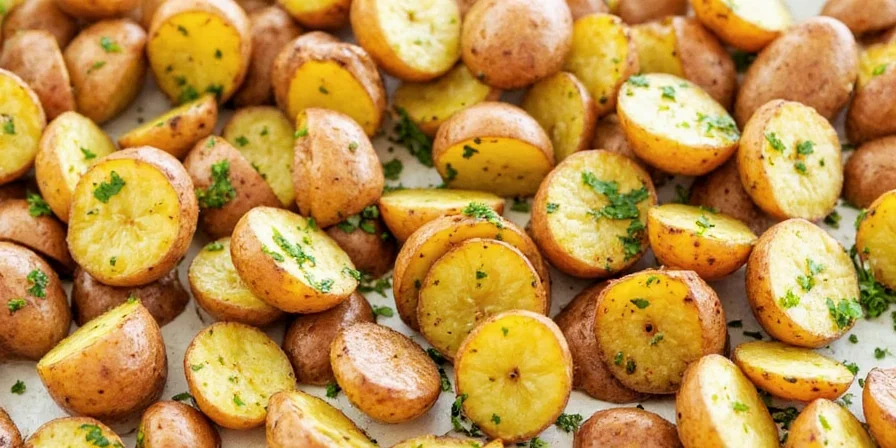









 浙公网安备
33010002000092号
浙公网安备
33010002000092号 浙B2-20120091-4
浙B2-20120091-4